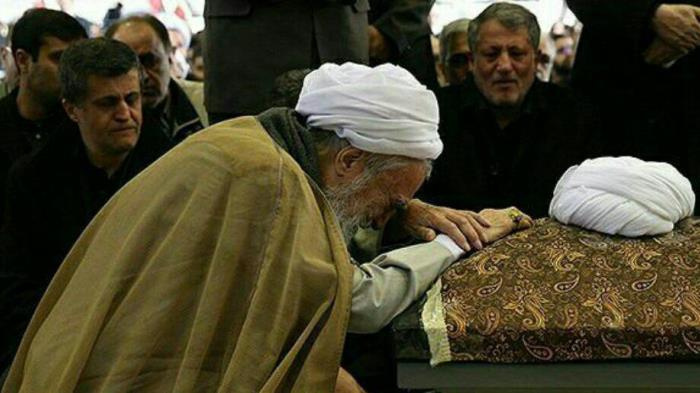Hashemi Rafsanjani’s Successors and the Reformists’ Test

(Picture: Ayatollah Movahhedi Kermani paying tribute to Akbar Hashemi Rafsanjani in his funeral.)
Unsubstantiated reports that Ayatollah Mohammad Ali Movahhedi Kermani will be the interim chairman of Iran’s Expediency Discernment Council, after the unexpected demise of ex-chief Ayatollah Akbar Hashemi Rafsanjani, made the rounds for two weeks before they became official news on Thursday. With forty-five members, the high-profile forum has the final say when differences occur between the parliament and the Guardian Council, as well as a consultative role in the country’s long-term strategies announced by the Supreme Leader after minor revisions. The current term in the Expediency Council will end in about a month, when the Supreme Leader will extend old or announce new appointments.
Even though Ayatollah Hashemi Rafsanjani had been sidelined from official politics in recent years, for his alleged support of post-election protests in 2009, dubbed as ‘sedition’ in official rhetoric, ever since his death on January 8, speculations about his potential successors in the various role he played have been in the air. Pro-reform spectra, closely affiliated with Hashemi Rafsanjani in recent years, naturally expected to have their own say in choosing his substitutes. A litmus test for an anticipated reconciliation between the Reformists and the establishment, such hopes were let down when the substitution process took turns rarely seen in advance.
Ayatollah Movahhedi Kermani, whose interim presidency over the Expediency Council has prompted speculations of his candidacy for the next term, is a remnant of the first generation of revolutionaries still in power, even though he may look low-key to the public eye. What most catches the eye in his background is his amicable alliance with the newly deceased Hashemi Rafsanjani.
During his years in seminary schools, he was engaged in religious debates with clerics, the likes of Hashemi Rafsanjani, Mohammad Beheshti, Morteza Motahhari, Ahmad Jannati, and Mahdavi Kani, who later became influential forces after the revolution. Early after the 1979 Islamic Revolution, he joined the Islamic Republic Party, with Hashemi Rafsanjani and Ayatollah Khamenei, as a central council member and arbitrator. The party later came to be the foundation of the establishment, in its present form. He was voted in the first Islamic Consultative Council, the parliament, representing Kerman, the same region Hashemi Rafsanjani hailed from. For four consecutive parliamentary terms, he represented Tehran, leading committees of domestic affairs and defense. Since dissolution of the Islamic Republic Party in early 1987, Kermani has been a prominent member of the rightist Combatant Clergy Association and the secretary-general since the death of Ayatollah Mahdavi Kani. In the meanwhile, he has been an elected member of the Assembly of Experts, during all its terms since it opened. Movahhedi Kermani has also served as the Supreme Leader’s representative in the IRGC. In 2012, he was appointed as an interim Tehran Friday Prayers leader.
Early in 2016, Movahhedi Kermani was placed in a list Hashemi Rafsanjani brokered for the Assembly of Experts. Iranian Students News Agency (ISNA) then quoted Movahhedi Kermani as also welcoming Hashemi Rafsanjani’s inclusion in a list of hopefuls supported by the Association. Kermani never hid that he had his own criticisms to Hashemi Rafsanjani, probably over his conduct during the ‘sedition’. However, he kept admiring Rafsanjani’s high-profile records and services in the Revolution and the establishment.
Elsewhere too, Rafsanajni has been substituted by a long-time ally, who has little to do with the Reformists. Apart from his presidency in the Expediency Council, Rafsanjani was one of the founders and major players in the nation-wide semi-private higher education initiative, called Azad University. However, the Supreme Leader Ayatollah Ali Khamenei appointed former foreign minister Ali-Akbar Velayati, who also serves as a foreign policy advisor to the Leader, as the head of the university’s board of directors due to a lack of clarity in the statute. In spite of his eight years’ experience in Hashemi Rafsanjani’s cabinet, Velayati identifies himself as a moderate Principlist. However, many believe that Velayati paid tribute to his boss when he refused to withdraw his candidacy in the 2013 presidential race and deprived Principlists from a major share of his 2.2 million votes. That election was finally won by Hassan Rouhani, who played Rafsanjani’s double after he was controversially disqualified on the pretext of old age by the Guardian Council.

